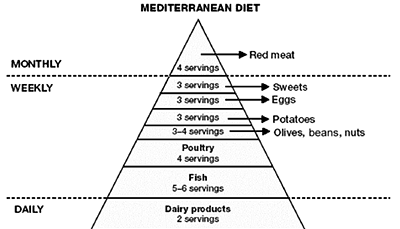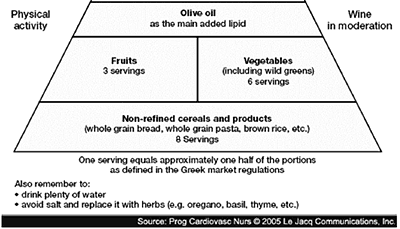Embracing the Mediterranean-Style Diet
Chances are that we all know someone who has been diagnosed with coronary heart disease (CHD). It is, after all, one of the most common chronic diseases. Diet is a first line defense for preventing and treating this condition, yet evidence suggests that the benefits of following the Mediterranean diet may outweigh those of low-fat diets often prescribed for people with CHD. In the Lyon Diet Heart Study, for example, the Mediterranean style dietary approach was found to be better than the older American Heart Association's low-fat diet in preventing heart attacks in people with heart disease. It was also more protective against certain cancers.
What is The Mediterranean Diet?
This eating pattern is based on the traditional diets of Greece, Crete and southern Italy. The pattern is similar but varies a bit in the 16 countries that border the Mediterranean Sea due to cultural differences. But here's what the overall pattern looks like: lots of vegetables and fruit, whole grain breads, unrefined cereals and dairy daily, with olive oil as the main source of added fat. It calls for fish, poultry and nuts weekly, with very moderate intake of sweets, eggs and potatoes. Red meat is eaten sparingly, about once a week, but moderate red wine is consumed daily.


Why is This Diet Heart-Healthy?
The fats you get from the Mediterranean diet are important. At least some of the diet's cardio-protective effects are due to the omega-3 fats found in fish. Fish oils have been shown to reduce the rate of heart attack and stroke over the long term. The diet contains a moderate amount of fat, with more coming from fish and less from red meat. It also relies on fats from heart-healthy nuts and olive (or canola) oil as the primary added fat. This type of fat has a more favorable effect on triglycerides and the "good" HDL cholesterol compared to the more typical low-fat diet. Another important benefit comes from whole grains and unrefined cereals. They offer lots of fiber and essential nutrients, as do vegetables and fruits.
Embracing the Mediterranean style diet doesn't mean you have to follow it exactly. For one thing, the number of servings will vary depending on body size, level of activity and overall calorie needs. Including foods from your own culinary heritage can be important too. Certain Asian patterns of eating are actually similar to the Mediterranean diet in that they focus on eating less red meat and more plant-based sources of fat and protein. If you use the pyramid as a general guide, here are a few things to keep in mind:
- Daily physical activity is the foundation of any healthful pyramid. Start by doing what activities you can do, since every little bit helps;
- Most people, especially non-dairy consumers, may need to take supplemental calcium and vitamin D. A healthy diet pyramid designed by Harvard experts also suggests taking a daily multi-supplement;
- While moderate alcohol intake is cardio-protective, daily consumption may not be right for everyone. Red wine can be a trigger for some migraine suffers, for example, and older women at risk for breast cancer are advised to limit alcohol consumption.
- Lastly, if you have an existing disease it's best to follow your health professional/s dietary advice.
- Curtis BM et al. Understanding the Mediterranean diet. Postgrad Med 112:online, 2002
- Bautista MC et al. The Mediterranean Diet: Is it cardioprotective? Prog Cardiovasc Nurs 20:70-76, 2005.
- Kinney JM. Challenges to rebuilding the US Food Pyramid. Cur Opin Clin Nutr Metab Care 8:1-7, 2005.















